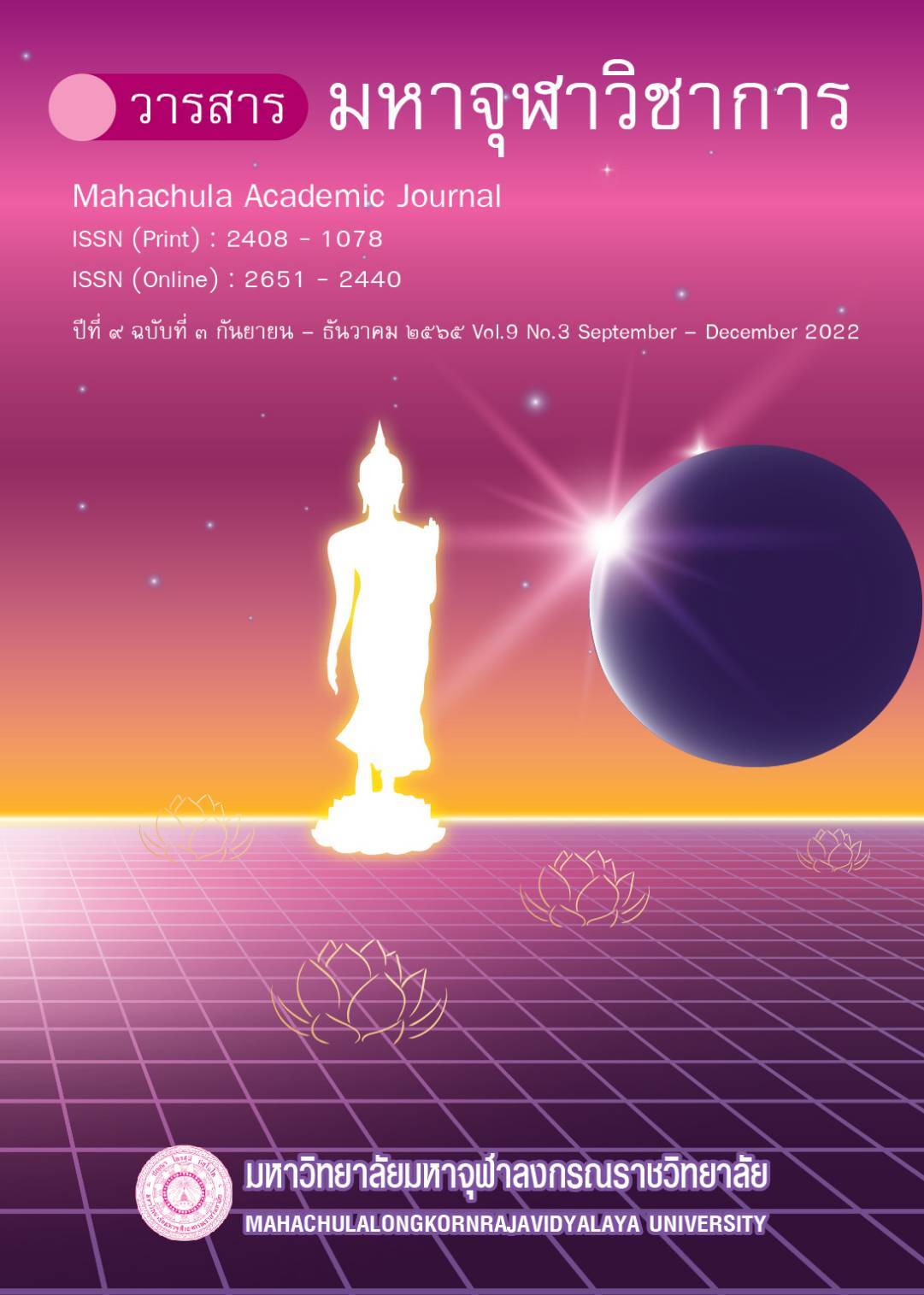Application to the principle of the administration of local administrative organizations in muang district suphanburi province
Main Article Content
Abstract
this research It has three objectives: (1) to study the level of application of the Saranee Dharma 6 principles to promote reconciliation in the administration of local government organizations, Muang District, Suphanburi Province; (2) to study the relationship between the 6 Saranee Dharma principles and to promote reconciliation in the administration of local government organizations, Muang District. (3) To suggest guidelines for the application of Saranee Dharma 6 to promote reconciliation in administration of local government organizations in Muang District, Suphanburi Province. The research is an integrated approach. between quantitative research and qualitative research
The results of the research found that Information about the general status of the sample revealed that most of the personnel were 142 females, aged 26-30 years, 72 persons with bachelor's degree, 118 persons, 86 persons were employers, with work experience. 6 - 10 years old, 92 people, respectively At the level of application of the Saranee Dharma 6 principles to promote reconciliation in the administration of local government organizations in Muang District, Suphan Buri Province, it was found that the Saranee Dhamma 6 principles and the administration of local government organizations in Muang District, Suphan Buri Province overall had a high average level. When considering each issue, it was found that the 6th issue was the principle of ditthisamanyata. The highest mean at the high level was 4.10. with the lowest mean at a very high level, 4.03, respectively. As for the promotion of reconciliation in the administration of administrative organizations, Muang District, Suphan Buri Province, it was found that the overall average was at a high level. When considering each aspect, it was found that the participatory and accepting management aspect The highest average was at a high level. 4.07 As for the administration by enforcing the law equally. The lowest mean was at a high level of 4.04, respectively.
The relationship between the Saranee Dharma 6 principles and the promotion of reconciliation in the administration of local administrative organizations in Muang District, Suphanburi Province found that the application of the Saranee Dharma 6 principles in organizational administration was not related to personal factors. And the application of the Saranee Dharma 6 principles in organizational administration is related to the promotion of reconciliation in the administration of local government organizations, Muang District, Suphanburi Province. The statistical significance at 0.01 level had a correlation value of 0.874. has the highest correlation which is in accordance with the assumptions set
Guidelines for applying the principle of Saranee Dharma 6 to promote reconciliation in the administration of local government organizations in Muang District, Suphan Buri Province (Performing goodwill to one another) Principles of mercy (Metta to one another reveals what is beneficial) Principle of compassion. (Set a good will and think of doing things that are beneficial to each other) principles of public health. (Sharing fortune and coordinating benefits acquired with each other) Silasamanyata principle (The conduct is in good faith and maintains the rules and regulations that have been placed). (Respect and listen to each other's opinions) is a practice principle to promote reconciliation in the administration of local government organizations, Muang District, Suphanburi Province.
Article Details

This work is licensed under a Creative Commons Attribution-NonCommercial-NoDerivatives 4.0 International License.
References
โกวิทย์ พวงงาม, ศ.ดร,. “การปกครองท้องถิ่นไทย”. กรุงเทพมหานคร : วิญญูชน, ๒๕๕๐.
นภดล สุรนัครินทร์. “การนำหลักธรรมาภิบาลมาปรับใช้ในองค์การบริหารส่วนตำบลตามทัศนะของประชาชนจังหวัดเชียงใหม่”. วิทยานิพนธ์รัฐประศาสนศาสตรดุษฎีบัณฑิต. บัณฑิตวิทยาลัย : มหาวิทยาลัย เชียงใหม่, ๒๕๔๗.
พระพรหมคุณาภรณ์ (ป.อ.ปยุตฺโต). ตอบคำถามของคณะบุคคลในเครือข่ายพระพุทธศาสนา ที่วัดญาณเวศกวัน. เมื่อวันที่ ๒๖ กุมภาพันธ์ ๒๕๔๙.
มหาวิทยาลัยสุโขทัยธรรมาธิราช. “การบริหารท้องถิ่น”. สาขาวิชาวิทยาการจัดการ. นนทบุรี : มหาวิทยาลัย สุโขทัยธรรมาธิราช, ๒๕๕๗.
ศิริรัตน์ คลังเย็น. “การบริหารงานสู่ความเป็นเลิศตามหลักพุทธธรรมาภิบาลขององค์กรปกครองส่วนท้องถิ่น”. วิทยานิพนธ์พุทธศาสตรดุษฎีบัณฑิต. บัณฑิตวิทยาลัย : มหาวิทยาลัยมหาจุฬาลงกรณราชวิทยาลัย, ๒๕๕๗.
สุบัณฑิต จันทร์สว่าง. “การประยุกต์ใช้หลักพุทธธรรมเพื่อการส่งเสริมความสมานฉันท์ในการบริหารองค์กรปกครองส่วนท้องถิ่น จังหวัดนครสวรรค์”. ดุษฎีนิพนธ์. ตามหลักสูตรปริญญาพุทธศาสตรดุษฎีบัณฑิต สาขาวิชารัฐประศาสนศาสตร์. มหาวิทยาลัยมหาจุฬาลงกรณราชวิทยาลัย, ๒๕๖๐.
สุบัณฑิต จันทร์สว่าง, ธิติวุฒิ หมั่นมี, สุรินทร์ นิยมาง. “การประยุกต์ใช้หลักพุทธธรรมเพื่อการส่งเสริมความสมานฉันท์ในการบริหารองค์กรปกครองส่วนท้องถิ่น จังหวัดนครสวรรค์”. วารสาร มจร สังคมศาสตร์ปริทรรศน์. Vol.8 No.2 April - June ๒๕๖๒.
องค์การบริหารส่วนจังหวัดสุพรรณบุรี. “ข้อมูลพื้นฐาน”. [ออนไลน์]. แหล่งที่มา https://www. suphan. go.th/content-10-182.html. ๗ สิงหาคม ๒๕๖๔.
อนุจิตร ชิณสาร. “การบริหารงานขององค์กรปกครองส่วนท้องถิ่นที่เป็นเลิศด้านความโปร่งใส และส่งเสริมการมีส่วนร่วมของประชาชน กรณีศึกษาองค์กรปกครองส่วนท้องถิ่นในจังหวัดนครราชสีมา”.วารสารชุมชนวิจัย. มหาวิทยาลัยราชภัฏนครราชสีมา ปีที่ ๑๕ ฉบับที่ ๑ มกราคม – มีนาคม ๒๕๖๔.
เอกชัย บุญยาธิษฐาน. “การบริหารความขัดแย้งในองค์กร”. กรุงเทพมหานคร : ปัญญาชน, ๒๕๕๕.
อัครเดช พรหมกัลป์. “การพัฒนารูปแบบการแก้ไขปัญหาความขัดแย้งตามหลักพุทธธรรมขององค์กรปกครองส่วนท้องถิ่น”. วิทยานิพนธ์พุทธศาสตรดุษฎีบัณฑิต. บัณฑิตวิทยาลัย : มหาวิทยาลัยมหาจุฬาลงกรณราชวิทยาลัย, ๒๕๕๕.
Ratthaphon Yenjaima. “Conflictin Society: Theory and Solution”. Journal of MCU Social Science. Review, Vol.7 No. 2 (2018).


